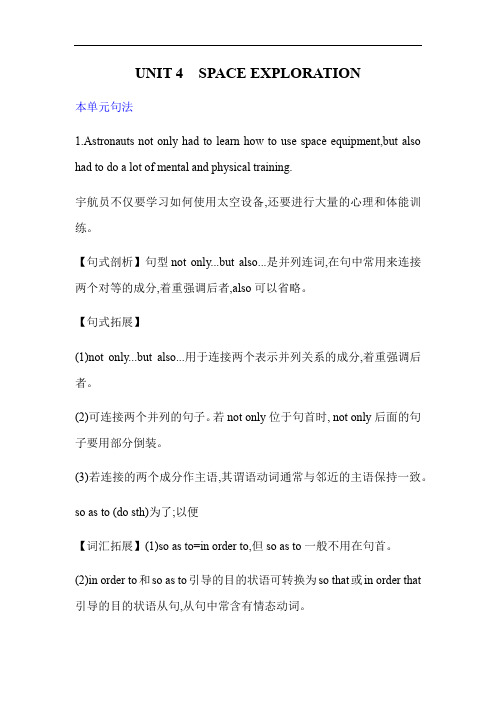Unit 4 语法要点
- 格式:pptx
- 大小:48.20 KB
- 文档页数:7


初中英语牛津译林版新教材七上Unit 4语言点和语法点整理▲Welcome to the unit1.the key to sth./the key to doing sth. ......的钥匙/做某事的关键Learning is the key to unlocking the world.学习是打开世界的钥匙。
/学习是解锁世界的关键。
2.get up 起床3.do morning exercises做早操 exercise(n.)可数:成套的运动 do eye exercises 做眼保健操do exercise 做锻炼 exercise(n.)不可数:锻炼do some/much/more exerciseDoing morning exercises is good for us.(动名词短语作主语,谓语动词用单数)4.have lessons 上课5.do after-school activities 进行课外活动after-school(adj.) 课外的,课后的after school(介词短语)放学后Students do all kinds of after-school activities.Students do all kinds of activities after school.6.help with housework 帮忙做家务7.do homework做作业do one’s/sb’s homework做作业One’s/sb’s:my/your/his/her/our/your/their肯定句:She often does her homework in time.疑问句:Does she do her homework in time?否定句:She doesn’t do her homework in time.8.go to bed 去睡觉9.on weekdays 在工作日10.---What time do you get up in the morning on weekdays?---I usually get up at 6:45 a.m.. (What time提问具体的时刻) when可以提问具体的时刻,也可以提问笼统的时间。

人教版九年级全一册英语Unit4单元语法知识点总结本单元重点短语的具体用法1. used to do:表示过去常常做某事,但现在不再这样做了。
例如:I used to play basketball, but now I prefer swimming.(我过去常打篮球,但现在我更喜欢游泳。
)2. deal with:意为处理、应对。
例如:How do you deal with stress?(你如何应对压力?)3. be proud of:表达为某事感到骄傲。
例如:I am proud of my son's achievements.(我为儿子的成就感到骄傲。
)4. take pride in:与be proud of 意思相近。
例如:She takes pride in her work.(她为自己的工作感到自豪。
)5. from time to time:意思是有时、偶尔。
例如:I still see him from time to time.(我仍然有时会见到他。
)6. in public:指在公共场合。
例如:She is very shy and doesn't like to speak in public.(她很害羞,不喜欢在公共场合讲话。
)7. in person:亲身、亲自。
例如:You should go and see it in person.(你应该亲自去看看。
)8. take up sth:开始做某事,占用(时间或空间)。
例如:He has taken up painting in his spare time.(他在业余时间开始画画。
)9. not...anymore:不再......。
例如:She doesn't live here anymore.(她不再住在这里了。
)10. worry about:担心、担忧。
例如:Don't worry about the exam, just do your best.(不要担心考试,尽力就好。

UNIT 4 SPACE EXPLORATION本单元句法1.Astronauts not only had to learn how to use space equipment,but also had to do a lot of mental and physical training.宇航员不仅要学习如何使用太空设备,还要进行大量的心理和体能训练。
【句式剖析】句型not only...but also...是并列连词,在句中常用来连接两个对等的成分,着重强调后者,also可以省略。
【句式拓展】(1)not only...but also...用于连接两个表示并列关系的成分,着重强调后者。
(2)可连接两个并列的句子。
若not only位于句首时, not only后面的句子要用部分倒装。
(3)若连接的两个成分作主语,其谓语动词通常与邻近的主语保持一致。
so as to (do sth)为了;以便【词汇拓展】(1)so as to=in order to,但so as to一般不用在句首。
(2)in order to和so as to引导的目的状语可转换为so that或in order that 引导的目的状语从句,从句中常含有情态动词。
He bought an iPad so as to/in order to surf the Internet.=He bought an iPad in order that/so that he could surf the Internet.为了上网,他买了一个iPad。
make sb do sth使某人做某事be made to do sth被迫做某事The boss made them do very heavy work.老板让他们干很重的工作。
They were made to do very heavy work.他们被迫干很重的工作。

⼈教版英语九年级上册Unit4知识点梳理及语法讲解Unit 4 I used to be afraid of the dark知识点讲解1. from time to time时常;有时,和sometimes, at times是同义表达。
常见的time短语有:what time ⼏点for the first time 第⼀次all the time ⼀直,总是;at times 不时,有时in time 及时;on time 按时,准时at the same time 同时have a good/great/wonderful time玩得开⼼3.It’s been three years since we last saw our primary school classmates.It has been+⼀段时间+since+含有过去式的陈述句“⾃…以来已经多长时间了”. 我在这⾥⼯作已经有⼀个半⽉了。
单项选择1、I’m looking after Tom today. He’s been in my house ________ 8:00 this morning.A.atB.sinceC.forD.till2、Shared bikes, which are environmentally friendly, _____ quite popular among big cities in China since last April.A.becameB.have becomeC.will become3、---Where is Jane? ---I don’t know. I ________ her since yesterday morning.A.haven’t seenB.didn’t seeC.won’t see4、Since we began to use the Internet, our lives _________ a lot.A.changeB.had changedC.will changeD.have changed4. I used to see him reading in the library every day.see sb. do sth . 看见某⼈做了某事指整个过程即:指动作经常发⽣或刚刚完成。

英语unit4九年级全一册笔记一、介绍Unit 4是九年级全一册英语教材中的一个重要单元。
该单元主要涵盖了旅行和交通相关的词汇和语法,同时也包括了一些与旅行相关的文化知识和常用表达。
学习这个单元可以帮助学生提高他们关于旅行和交通的英语表达能力,同时也有助于丰富他们对不同文化的了解。
二、重点词汇1. journey (n.) 旅行2. destination (n.) 目的地3. sightseeing (n.) 观光4. transport (n.) 交通工具5. amodation (n.) 住宿6. reservation (n.) 预订7. departure (n.) 出发8. arrival (n.) 到达三、语法要点1. 现在进行时:表示现阶段正在发生的动作或状态。
e.g. We are taking a trip to Beijing next week.2. 一般过去时:表示过去某个时间内发生的动作或状态。
e.g. They visited the Great Wall last year.3. 情态动词can/could:表示能力、请求、许可等。
e.g. I can speak English fluently.四、典型句型1. How long have you been in Beijing?2. What are you going to do there?3. Would you mind taking the window seat?五、文化知识1. 我国的交通工具有地铁、高铁、公交车等,而外国也有地铁、火车、飞机等不同的交通工具。
2. 在一些西方国家,人们会习惯性地握手问候。
而在我国,人们会用双手合十作为问候的方式。
六、环节安排1. 学生阅读相关课文,理解基本内容和语法要点。
2. 学生进行对话练习,模拟旅行场景,增加语言运用能力。
3. 学生自主积累相关词汇,写作旅行计划或游记。
Unit 4 Don’t eat in class.1.短语归纳2.典句必背3.用法集萃(1)Don’t arrive late for class. 不要上课迟到❖arrive in❖arrive at(2)You must be on time. 你必须准时。
❖on time是固定搭配,意为“按时;准时”。
例:Don’t worry. The train will arrive on time. 别担心。
火车会准时到达的。
❖常见的time短语(3)Don’t listen to music in class. 不要上课时听音乐牛刀小试—Do you like the songs by Taylor?一Yes. Country music ______ nice and full of feelings.A. SoundsB.listensC. hearsD. looks(4)This is very important. 这是很重要的❖important作形容词,意为“重要的”。
如:The first lesson is very important. 第一课是很重要的❖反义词:unimportant adj. 不重要的❖派生词:importance n. 重要;重要性(5)Can we bring music players to school? 我们可以把音乐播放器带到学校里来吗?❖bring作动词,意为“带来;拿来”例:Don’t forget to bring your homework here. 不要忘记把你的家庭作业带过来❖辨析bring, take, carry和get牛刀小试Don’t forget _____ your photos here when you come to school.A.bringingB. to takeC. takingD. to bring(6)Oh, and we also have to be quiet in the library. 哦,我们在图书馆里还必须保持安静❖quiet作形容词,意为“安静的”,可以用来修饰人,也可以用来形容地点或场所等。
七上英语unti4知识点
Unit 4的知识点包括但不限于:
1. 词汇:包括名词(如backpack、book、pencil等)、形容词(如old、new、big等)、动词(如have、need、find等)和介词(如in、on、under等)。
2. 语法:一般现在时的使用,包括主语+动词原形的结构,以及疑问句和肯定句的变换。
指示代词this和that的使用也是重要的知识点。
3. 物品位置的描述:可以使用where引导的疑问句来询问物品的位置,以
及介词on表示物品在某物的上面。
4. 动词的用法:take表示从近处带到远处,而bring表示从远处带到近处。
5. some和any的使用:some一般用于肯定句,any用于否定句和疑问句。
在表示请求、建议、征求意见等委婉语气的疑问句中,用some而不用any。
6. 名词所有格:在英语中,表达“我的”、“你的”、“他的”时,可以使用代词my、your、his等。
7. 其他语法点:比如指示代词these和those的使用。
this用于指离说话
者近的人、物,that用于指离说话者远的人、物;同时,在表达“我的”、“你的”、“他的”时,也可以使用名词所有格形式,如my backpack、your book、his pencil等。
以上内容仅供参考,建议查阅七年级英语课本或咨询英语老师,获取更准确的信息。
外研版(2024)七年级上册英语Unit 4 重点语法知识点背记提纲Unit 4 Time to celebrate课时1Starting out & Understanding ideas: Reading重点单词1. unusual adj. 不平常的2. treat v. 请客,款待,招待3. myself pron. 我本人,我亲自,我自己4. dumpling n. 水饺5. whole adj. 全部的,整个的6. become v. 成为,变成7. chef n. 厨师8. balloon n. 气球9. cucumber n. 黄瓜10. hang v. 悬挂11. lantern n. 提灯;灯笼12. dish n. (烹制好的)菜肴,一道菜13. joke v. 说笑话;开玩笑14. shocked adj. 震惊的15. laugh v. 发出笑声,(大)笑16. pork n. 猪肉17. round adj. 圆形的,环形的18. shape n. 形,形状,外形19. reunion n. 团圆,团聚20. piece n. 片;块;段;截21. knife n. 刀22. smell n. 气味23. laughter n. 笑;笑声24. fill v. (使)充满;装满25. meal n. 一餐;饭26. miss v. 思念,想念,怀念(某人);错过27. taste n. 味道,滋味28. celebrate v. 庆祝单词变形1. usual—unusual (反义词)2. Britain—British (形容词,英国的,英国人的)3. can—could (过去式)4. hang—hung (过去式)5. chef—chefs (复数)6. dish—dishes (复数)7. laugh—laughter (名词,笑;笑声)8. knife—knives (复数)9. miss—misses (第三人称单数)10. celebrate—celebration (名词,庆祝)重点短语1. by the end of 到……结束为止2. be able to do sth. 能够做某事3. during the Spring Festival 在春节期间4. family reunion 家庭团聚5. my whole family 我整个家庭6. against the law 违法7. stand for 代表8. feel like 感觉像;想9. the way of doing sth. 做某事的方式10. fill…with… 用……把……充满重点句型1. I wanted to treat my British friend, Emilia, to a Chinese dinner.我想请我的英国朋友埃米莉亚吃一顿中式晚餐。